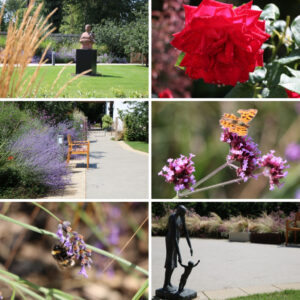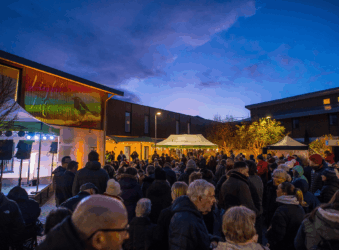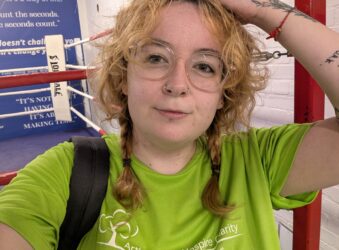Diane’s Story
Share this story
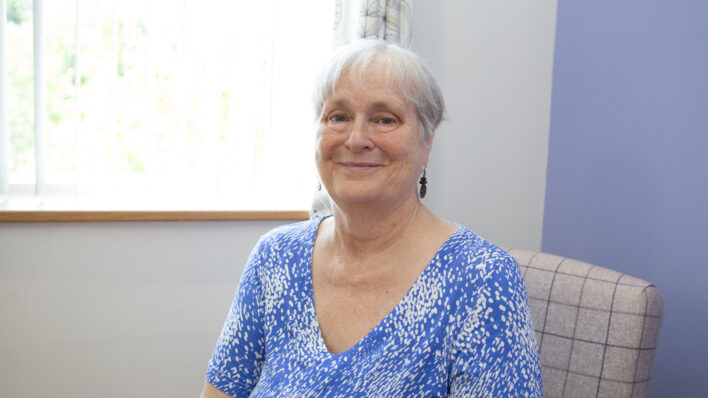
Diane has been coming to the Living Well Service, once a week, for an eight week programme. She kindly shared her experience.
“I’ve had seven sessions from an eight week program. I couldn’t come for one of the sessions – people [at the Hospice] were very flexible about that. I think it’s very difficult to walk through the door sometimes to a Hospice because the only reason you’re there is because of your personal circumstances. I knew everybody would be nice to me but it can still be difficult. But then, once you have, I think there are lots of options and the clinical staff are very prepared to help.
I think the thing that’s most interesting is everybody’s well prepared and well-read before you walk through the door and the clinical staff know your name. I’d had a telephone interview for about an hour before I came to the Living Well Service and I’d mentioned that my hobbies were contemporary dance and when I came here I wanted to do a gym session. The person who saw me knew that and I think that’s one of the things that’s very impressive about the Hospice. I was so impressed. It does feel that it’s personally tailored to you.
One or two things happened to me during the course and the clinical staff remembered. When I went to my nieces wedding they asked me about it. You do feel that you’re part of the community here.
What did you do at the Living Well Service?
There’s an easy introduction each time, where you have a cup of tea made for you and you can sit and have a chat. I’ve done a variety of sessions. Although the course can give you help on doing things like preparing for the future, in terms of a will or lasting power of attorney, it’s the nicer things that I wanted to do! I had a foot massage, some reflexology and had an Indian head massage. They are nice and relaxing things to do. Some people might be put off by the idea of doing them but, I thought I would give it a go. In the past I’ve had Thai massages where people have been too firm but no one is going to do that to you here. It was nice to be able to relax in an environment where people understand what your condition is. There are lots of opportunities but nobody makes you do anything you don’t want to.
How has the Living Well Service supported your quality of life?
I wanted to do gym sessions because one of the things that I’ve had to give up, because of my illness, is dance. I have danced contemporary dance and ballet all my life but now because I’ve got some spinal fractures I am restricted. I wanted to exercise where I feel safe. The Occupational Therapists and Physios at the Hospice had the time to help me.
At Living Well I was able to say exactly what I wanted to be able to do and together we had a look at whether that was possible. I think having that clear sense of parameters is really useful. So, by coming here, with advice of the Therapy Team and with some very clear instructions on what I am able to do and what I really shouldn’t, it’s been great and I can now do a few exercises.
When you’re ill, sometimes you have to give up things. That’s quite hard and anything you can do, even if it’s only a little bit can make you feel better. So occasionally now I’ll go in for just the first ten minutes of my previous hour long dance class. It’s better to do the ten minutes and then watch the class than not do anything at all because if you do nothing at all, you’re just missing out. So that help [with the Hospice Therapy Team] has enabled me to take a little bit more interest in participation and to see my friends. It can be a bit depressing otherwise to go and just watch other people do what you can’t do. They all very much cheer me on when I can go – it’s good. It’s also given my normal dance teacher plenty of confidence in having me in the class too.
How did the Living Well Service support advance care planning?
In the other area that the course has helped me is one of the nurses helped me fill in the ReSPECT form. When you’re in my situation, you might need to fill in a form like that or you might need to consider your future options. I think sometimes at an intellectual level, you can do it but when you actually come to fill in the form, it feels very challenging. I got help here [at the Living Well Service]. I know this sounds like a very small distinction but actually it was extremely useful that Gemma Irvine [Clinical Nurse Specialist] talked me through filling in the form with me. I thought it was going to be a binary experience, just yes and no answers but it isn’t. I talked [with Gemma] so I had a deeper understanding of what the future is. You can change your mind in the future too, it isn’t a now and forever situation.
The Hospice registered it [the ReSPECT form] with the GP. They’ve also shown me how to leave it round the house so people know where to access it and that took a weight off my mind. Before [the form] was in a box at the side and I kept picking it out and looking at it thinking ‘I really need to do that’ but I couldn’t bring myself to do it. I think sometimes just being in an environment where people understand why you might not find that easy is useful.
I had the option to do it over more than one session. I booked to do it, but there was also the option, if I wasn’t ready or if I wanted to reflect on what I had written, to stop and go back. So, at no point you would ever feel that anyone was pushing you to do anything.
I think sometimes we do things for other people as well because I know that my brother will find it difficult. I’ve left him a little book of instructions. I feel that I’m helping him by sorting things out because it’s hard enough when someone dies.
I sorted out a Will and lasting power of attorney years ago but even with that level of organisation, there’s been something extra that’s been offered here [Living Well Service] that’s been helpful to me, like the psychological side of things.
How has the Living Well Service supported you in other tasks?
With my treatment, there are almost like gateways that you have to go through. This afternoon I’ve got some scan results and I’m not looking forward to that. On a day to day basis, you try and live the best life you can but occasionally you have to remind yourself why it’s not all going as well as you’d like. I think the good thing about this is that you’re with other people, who don’t necessarily have anything like what you’ve got, but you know everyone’s got a challenge and so we all understand that about each other.
Was there anything that surprised you at the Living Well Service?
Another thing I’ve been doing here is Music Therapy. I never thought I’d be singing in public anywhere, which was interesting! I got to play a couple of drums which I’d not played before – that was quite entertaining. I was sitting there playing this Indian Tongue drum thinking, ‘Who thought I’d be doing this and singing as well!’
We shared some jokes about the kind of songs I might want to sing. Some of them were happy, some of them were a bit sad really but they can sing those when I’m gone, but not now! There’s a variety of things here and not everything will suit everybody all the time, that’s obvious. But nobody makes you do anything you don’t want to do and sometimes it’s worth trying it, seeing if you like it.
There are other things that happen here. I’ve never been a huge dog fan – I like cats. We have PAT dogs that come here and see us. For people who love dogs, I’m sure that’s great and I don’t mind. They’re actually very sweet and hilarious! So, my point being that, there’s something for everyone but not everything’s for everyone.
I’ve also done some of the relaxation sessions at the end. Usually I’m not the most relaxed person on the planet and I’ve got my own techniques for that but the techniques that are taught here are very good. Before I came here, when I was having MRI scans (and many of us who are here have to have a lot of scans) and you’re a long time in that noisy machine and it’s not easy. So, for myself, I used meditation techniques to visualise myself on a walk at a particular holiday destination that I know.
One of the things that they do [at Living Well] in a relaxation session is to help you to take yourself [mentally] to a different place where you can feel comfortable. You may or may not use it in day to day life but my guess is that at least if you were going to have to face something like an MRI scan and you were going to be there for a while and it wasn’t going to be the most comfortable, it is actually quite a useful technique. So, there are other things on offer here which you can apply in different places.
How did you hear about Arthur Rank Hospice Charity?
I asked the hospital to refer me for pain control and they mentioned the Living Well Service at the Hospice.
I have lived in Cambridge for 19 years and I have visited your charity shop on Mill Road so I’d heard of the Charity. It’s reputation proceeds it and I knew it wasn’t going to be a scary place at all. But, that doesn’t always change things. The garden here is beautiful and it’s a very pleasant place to come and it doesn’t feel medical at all.
In your life that you don’t necessarily think ‘ I’m going to be doing that’ but it’s fine and it causes you to look back and think about your own circumstances and those of other people. Very often you think, ‘well, this may not be working out for me but that’s ok. All the people who work here are extremely friendly and pay attention.
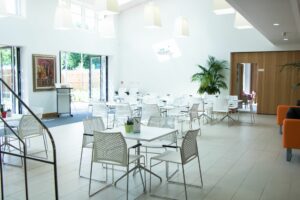
I think it helps with the Bistro where you can go and have a drink. Of course many people will support you by giving you a drink when you’re here, it’s not like you have to go to the Bistro but I’m going to have lunch there today because I’ve got a hospital appointment this afternoon and it’s just handy to stop off and have some lunch before the taxi comes to pick me up.
What would you say to somebody who is thinking of coming to the Living Well Service?
I would say to them: give it a go because you’ll get something out of it. I’m the kind of person, if I haven’t liked it, I wouldn’t have come back. There’s almost certainly going to be something here that will help you. It’s not all forced jolliness. There’s probably some things that will surprise you, that you didn’t think would be helpful to you but actually are and there are other things like techniques to relax you. No one’s going to make you but if you’re prepared to give a little bit of yourself you’ll probably get even more out of it. If you just want to be quiet and reflect and watch, that’s fine too.
Our ‘Outstanding’ services are provided free of charge to patients and their families. Our aim being to provide the highest quality care, helping people to make every moment count. You can find out more about how we are funded here: arhc.org.uk/how-we-are-funded.
View other stories
-

Comfort and Light at Hospice’s ‘Light up a Life’ Celebration
Light up a Life brought the community together to remember loved ones
-

Rosemary volunteers at Arthur Rank Hospice Charity for over 40 years!
Rosemary Hall shares her volunteering experience which spans over 40 years!
-

Erica’s Story
Erica shares her experience of when her Dad, John Rowell, who was cared for in the Inpatient Unit
-

Hospice supporter takes on Boxing Challenge in memory of her Mum
26 year old says thank you for the care of her Mum by taking on a Boxing Challenge
